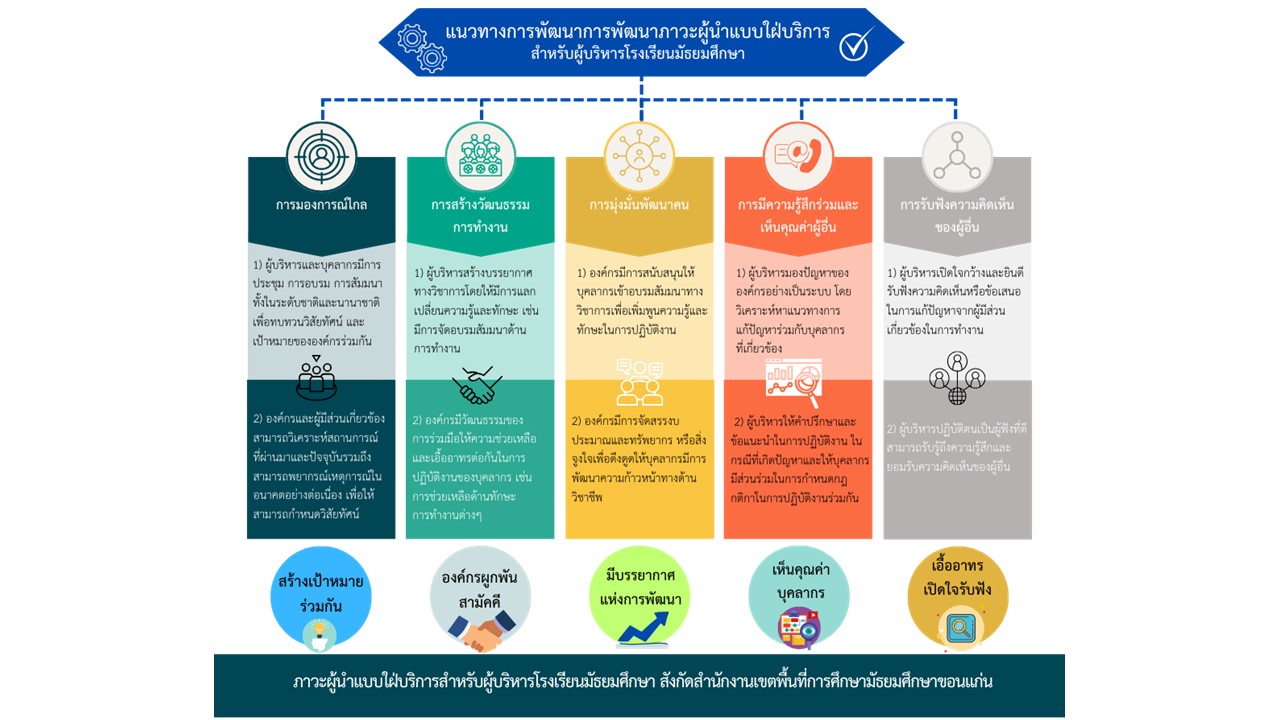แนวทางการพัฒนาภาวะผู้นำแบบใฝ่บริการสำหรับผู้บริหารโรงเรียนมัธยมศึกษา สังกัดสำนักงานเขตพื้นที่การศึกษามัธยมศึกษาขอนแก่น
Main Article Content
บทคัดย่อ
การวิจัยนี้มีวัตถุประสงค์เพื่อ 1) ศึกษาสภาพปัจจุบัน สภาพที่พึงประสงค์ และความต้องการจำเป็นในการพัฒนาภาวะผู้นำแบบใฝ่บริการสำหรับผู้บริหารโรงเรียนมัธยมศึกษา และ2) ศึกษาแนวทางพัฒนาภาวะผู้นำแบบใฝ่บริการสำหรับผู้บริหารโรงเรียนมัธยมศึกษา สังกัดสำนักงานเขตพื้นที่การศึกษามัธยมศึกษาขอนแก่น โดยใช้การวิจัยแบบผสมผสานวิธี แบ่งเป็น 2 ระยะ คือระยะที่ 1 การศึกษาสภาพปัจจุบัน สภาพที่พึงประสงค์ และความต้องการจำเป็นในการพัฒนาภาวะผู้นำแบบใฝ่บริการ กลุ่มตัวอย่าง 344 คน โดยใช้แบบสอบถามมาตรประมาณค่า 5 ระดับ วิเคราะห์ข้อมูลโดยหาค่าเฉลี่ย ส่วนเบี่ยงเบนมาตรฐาน และค่าดัชนีความต้องการจำเป็น ระยะที่ 2 การศึกษาแนวทางการพัฒนาภาวะผู้นำแบบใฝ่บริการ และประเมินความเหมาะสม ความเป็นไปได้ และความเป็นประโยชน์ของแนวทางพัฒนาโดยผู้ทรงคุณวุฒิ เก็บรวบรวมข้อมูลโดยใช้แบบสัมภาษณ์ และแบบประเมินแนวทางพัฒนา วิเคราะห์ข้อมูลโดยใช้ค่าเฉลี่ย และส่วนเบี่ยงเบนมาตรฐาน ผลการวิจัยพบว่า 1) สภาพปัจจุบันโดยรวมอยู่ในระดับปานกลาง ส่วนสภาพที่พึงประสงค์โดยรวมอยู่ในระดับมากที่สุด และมีความต้องการจำเป็นในการพัฒนา คือ ด้านการสร้างวัฒนธรรมการทำงาน (PNImodified = 0.57) ด้านการมุ่งมั่นพัฒนาคน (PNImodified = 0.54) ด้านการมีความรู้สึกร่วมและเห็นคุณค่าผู้อื่น (PNImodified = 0.45) ด้านการมองการณ์ไกล (PNImodified = 0.43) และด้านการรับฟังความคิดเห็นของผู้อื่น (PNImodified = 0.37) ตามลำดับ 2) แนวทางพัฒนาภาวะผู้นำแบบใฝ่บริการสำหรับผู้บริหารโรงเรียนมัธยมศึกษา สังกัดสำนักงานเขตพื้นที่การศึกษามัธยมศึกษาขอนแก่น ไดแก่ 1) ทบทวนวิสัยทัศน์และเป้าหมายร่วมกัน 2) สร้างบรรยากาศทางวิชาการและวัฒนธรรมแห่งความร่วมมือ 3) สนับสนุนให้บุคลากรเพิ่มพูนความรู้และก้าวหน้าทางวิชาชีพ 4) วิเคราะห์ปัญหาองค์กรอย่างเป็นระบบโดยความร่วมมือของบุคลากร และ5) เปิดใจกว้างเป็นผู้ฟังที่ดี รับรู้ และยอมรับความคิดเห็นผู้อื่น มีผลการประเมินความเหมาะสม ความเป็นไปได้ และความเป็นประโยชน์โดยรวมอยู่ในระดับมากที่สุด
Article Details
เอกสารอ้างอิง
แก้วตา ผู้พัฒนพงศ์. (2556). การจัดการและพฤติกรรมองค์การ. กรุงเทพฯ: สำนักพิมพ์มหาวิทยาลัยรามคำแหง.
จิรวรรณ เล่งพานิชย์. (2554). โมเดลสมการโครงสร้างภาวะผู้นาแบบใฝ่บริการของ ผู้บริหารสถานศึกษา ขั้นพื้นฐาน. วิทยานิพนธ์ ปร.ด. ขอนแก่น : มหาวิทยาลัยขอนแก่น.
ชนิตวสรณ์ ตรีทยาภูมิ. (2564). ศาสตร์การนิเทศการสอนและการโค้ช การพัฒนาวิชาชีพ : ทฤษฎี กลยุทธ์สู่การปฏิบัติ. กรงเทพฯ : มหาวิทยาลัยศิลปากร.
เทียนชัย ไชยเศรษฐ. (2552). “ค่านิยมคืออะไรและสําคัญอย่างไร.” Spirit บ้านเรา. ปีที่ 25 ฉบับที่ 475.
บังอร ไชยเผือก. (2550). การศึกษาคุณลักษณะของผู้นำแบบผู้รับใช้และบรรยากาศของโรงเรียนคาทอลิก สังกัดคณะภคินีพระกุมารเยซู. สารนิพนธ์ กศ.ม. กรุงเทพฯ : มหาวิทยาลัยศรีนครินทรวิโรฒ.
ปัทมาพร ศรีกําพล. (2557). ความสัมพันธ์ระหว่างภาวะผู้นําแบบผู้รับใช้ของผู้บริหารสถานศึกษาวัฒนธรรมองค์การกับประสิทธิผลของโรงเรียนเขตพื้นที่การศึกษาประถมศึกษาระยอง เขต 2. วิทยานิพนธ์การศึกษาดุษฎีบัณฑิต, การบริหารการศึกษา, คณะศึกษาศาสตร์, มหาวิทยาลัยบูรพา.
ยุภา นารินนท์. (2563). ผู้นำท้องถิ่นกับการสื่อสาร. วารสารมนุษยศาสตร์และสังคมศาสตร์ มมร.วิทยาเขตอีสาน. 1(3), 38-44
วงศกร สิงหวรวงศ์. (2561). กระบวนการสื่อสาร และปัจจัยการสื่อสารที่มีผลต่อกระบวนการตัดสินใจ. วิทยานิพนธ์หลักสูตรศิลปศาสตรมหาบัณฑิต คณะนิเทศศาสตร์และนวัตกรรมการจัดการ สถาบันบัณฑิตพัฒนบริหารศาสตร์.
วิโรจน์ สารรัตนะ.(2556). กระบวนทัศน์ใหม่ทางการศึกษา กรณีทัศนะต่อการศึกษาศตวรรษที่ 21. กรุงเทพฯ : ทิพยวิสุทธิ์.
สัมฤทธิ์ กางเพ็ง และ สรายุทธ กันหลง. (2563). ภาวะผู้นําใฝ่บริการในองค์การ : แนวคิด. หลักการทฤษฎี และงานวิจัย. ขอนแก่น : คลังนานาวิทยา.
สัมฤทธิ์ กางเพ็ง. (2563). ภาวะผู้นำแบบใฝ่บริการของผู้บริหารสถานศึกษาที่ส่งผลต่อความมุ่งมั่นในการทำงานของครู. มหาสารคาม: อภิชาติการพิมพ์.
สำนักงานคณะกรรมการการศึกษาขั้นพื้นฐาน. (2553). พระราชบัญญัติการศึกษาแห่งชาติ พ.ศ.2542 และที่แก้ไขเพิ่มเติม (ฉบับที่ 3). พ.ศ.2553.กรุงเทพฯ: สํานักนายกรัฐมนตรี.
สำนักงานคณะกรรมการการศึกษาขั้นพื้นฐาน. (2555). มัธยมศึกษายุคใหม่สู่มาตรฐานสากล 2561. กรุงเทพฯ: ผู้พิมพ์.
สุวิมล ว่องวาณิช. (2562). การวิจัยประเมินความต้องการจำเป็น. พิมพ์ครั้งที่ 4. กรุงเทพฯ: สำนักพิมพ์จุฬาลงกรณ์มหาวิทยาลัย.
องอาจ สิมเสน. (2556). ภาวะผู้นำใฝ่บริการของผู้บริหารที่ส่งผลต่อประสิทธิผลของโรงเรียน สังกัดสำนักงานเขตพื้นที่การศึกษามัธยมศึกษา เขต 25. วิทยานิพนธ์ศึกษาศาสตรมหาบัณฑิต, สาขาวิชาการบริหารการศึกษา, บัณฑิตวิทยาลัย, มหาวิทยาลัยขอนแก่น.
อนุวัต กระสังข์. (2560). ทฤษฎีภาวะผู้นำใฝ่บริการ : ทิศทางการบริหารจัดการขององค์การในอนาคต,วารสาร มจร สังคมศาสตร์ปริทรรศน์ ฉบับภาษาไทย, 6(4), 112-126.
อภิชาติ อนันตภักดิ์. (2558). ภาวะผู้นำแบบผู้รับใช้ของผู้บริหารโรงเรียนที่ส่งผลต่อความผูกพันต่อองค์กรของข้าราชการครู สังกัดสำนักงานเขตพื้นที่การศึกษาประถมศึกษากาฬสินธุ์ เขต 3. วิทยานิพนธ์ปริญญาการศึกษามหาบัณฑิต (การบริหารการศึกษา) คณะศึกษาศาสตร์ มหาวิทยาลัยบูรพา.
Greenleaf, R.K. (2002). Servant Leadership: A Journey into the Nature of Legitimate Power and Greatness. NJ: Paulist Press.
Hunter, E.M., Neubert, M.J., Perry, S.J., Witt, L.A. Penney, L.M., and Weinberger, E. (2013). Servant Leaders Inspire Servant Followers: Antecedents and Outcomes for Employees and the Organization. Leadership Quarterly, 24, 316–331.
Page, D., & Wong, T. P. (1998). A Conceptual Framework for Measuring Servant Leadership. Unpublished Manuscript Langley, Canada: Trinity Western University.
Parris, D. L., and Peachey, J. W. (2013). A Systematic Literature Review of Servant Leadership Theory in Organizational Contexts. Journal of Business Ethics, 113(3), 377–393.
Russell, R. F., and Stone, A. G. (2002). A Review of Servant Leadership Attributes: Developing a Practical Model. Leadership and Organization Development Journal, 23(3), 145–157.
Spears, L. C. & Lawrence, M. (Eds.). (2002). Focus on Leadership: Servant leadership for the 21st century. New York: John Wiley & Sons.
Spears, L. C. (2004). The Understanding and Practice of Servant Leadership. In L.C. Spears, & M. Lawrence (Eds), Practicing servant leadership: Succeeding.
van Dierendonck, D. (2011). Servant Leadership: A Review and Synthesis. Journal of Management, 37(4), 1228–1261.
Winston, B. E., and Fields, D. (2015). Seeking and Measuring the Essential Behaviors of Servant Leadership. Leadership and Organization Development Journal, 36(4), 413–434.
Wong, P. T. P. & Davey, M. A. (2007). Best Practice in Servant Leadership. http://www.regent.edu/ecad/global/publications/sl_proceeding/2007 /pdf/wong-davey.pdf


